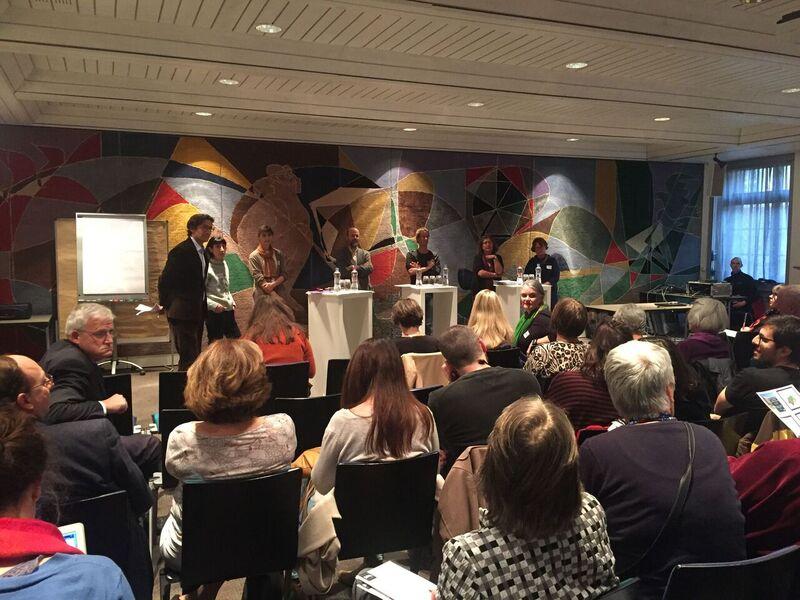Review of fifth dialogue event

What is "good dying", and who defines it? Researchers and practitioners discussed possible answers to this question at the fifth and last dialogue event.
Like the previous four events in this series, the fifth and final dialogue event aimed to foster dialogue between researchers and representatives of the practical realm. The subject was "Good dying: cultural and social concepts and ideals". Ursula Streckeisen, sociology professor and member of the Steering Committee of NRP 67, started off the event with the words "Dying as a process is shaped by society". Andrea Büchler, the president of the National Ethics Commission for human medicine (NEC), praised the high-quality research carried out in NRP 67 and the open discussions with practitioners as important contributions that brought us nearer to a definition of "good dying".
In the first research presentation, Corina Salis Gross (University of Bern) presented the results of the project "End of life and diversity in nursing homes". Nursing homes are increasingly turning into institutions for the dying in which death is more visible and more openly talked about than it used to be. The researchers found that palliative care principles had already taken root in nursing homes. "Caregivers try to provide 'good dying' by adhering to normative labels," said Salis Gross. However, these practices are not explicitly discussed in teams and are not to be found in any guideline documents. An interesting insight shared by Salis Gross was that the dying process did not seem to be markedly different for people with different cultural backgrounds, even though differences were clearly visible at the time of admission or in daily routines. "Towards the end of the dying process, we all become very much alike, irrespective of our backgrounds. At this stage individual needs are much more important than someone’s migration background," Corina Salis Gross concluded.
The dying often tell carers about their dreams or visions, irrespective of how strongly they believe in religion or spirituality. In the research project "Visions at the end of life. Approaches to spiritual care" Simon Peng-Keller (University of Zurich) investigated the spiritual-care potential of such visions. He emphasised how important they were for the dying, how they comforted them and made them and their families more calm and accepting. Simon Peng-Keller concluded that it is necessary to make society more aware of the fact that visions can help the dying and that they are not something to be worried about.
The final research presentation was given by Mathieu Bernard (CHUV Lausanne), who presented the findings of the project "Meaning in life, spirituality and personal values at the end of life". Almost 600 people in the three main language regions of Switzerland were interviewed in the context of this study. In our society work plays a key role for many people and the pressure to achieve is very high; but the survey shows that family, personal relationships, or religion and spirituality are more meaningful than achievement for people at the end of life. Spiritual wellbeing plays an important part in easing psychological strain in this context. The study did not discover any regional differences.
The final presentation was followed by a discussion between the researchers and practitioners attending the event: Sibylle Jean-Petit-Matile, deputy director and chief physician of the Hospice Zentralschweiz, Hildegard Hungerbühler, head of research and development at the Swiss Red Cross and Karin Tschanz, training supervisor for palliative and spiritual care, pastoral caregiver at Klinik Hirslanden Aarau and co-vice president of palliative.ch. Their observations confirmed the findings of the researchers: the dying rituals of people from different cultures were very similar. Based on their work experiences they were also able to confirm that personal growth and relationships were more important at the end of life than the jobs people used to do or their health. Moreover, they felt that the study of visions was very helpful, as sensitising society to such visions would make them more acceptable and more integral to the dying experience.
Ursula Streckeisen then rounded off the event with a few concluding words. She argued that we need to ask ourselves how far someone's individual wishes conform with social norms. While individuals are free to distance themselves from social values, the same values nonetheless play a role in decisions on how to put wishes for a "good death" into practice. This also poses a challenge to practitioners. She believes that it is important that professionals in the field have more time to reflect not only on their everyday experiences, but also on more far-reaching developments and their significance. A question that has remained largely unanswered is how to make dying easier for people who did not have a religious background. Studies have shown that Swiss society is not on a trajectory back to church. In Streckeisen’s view, it is therefore important to investigate how conditions for "good dying" can be created for people who do not consider themselves to be religious or spiritual in any way.
